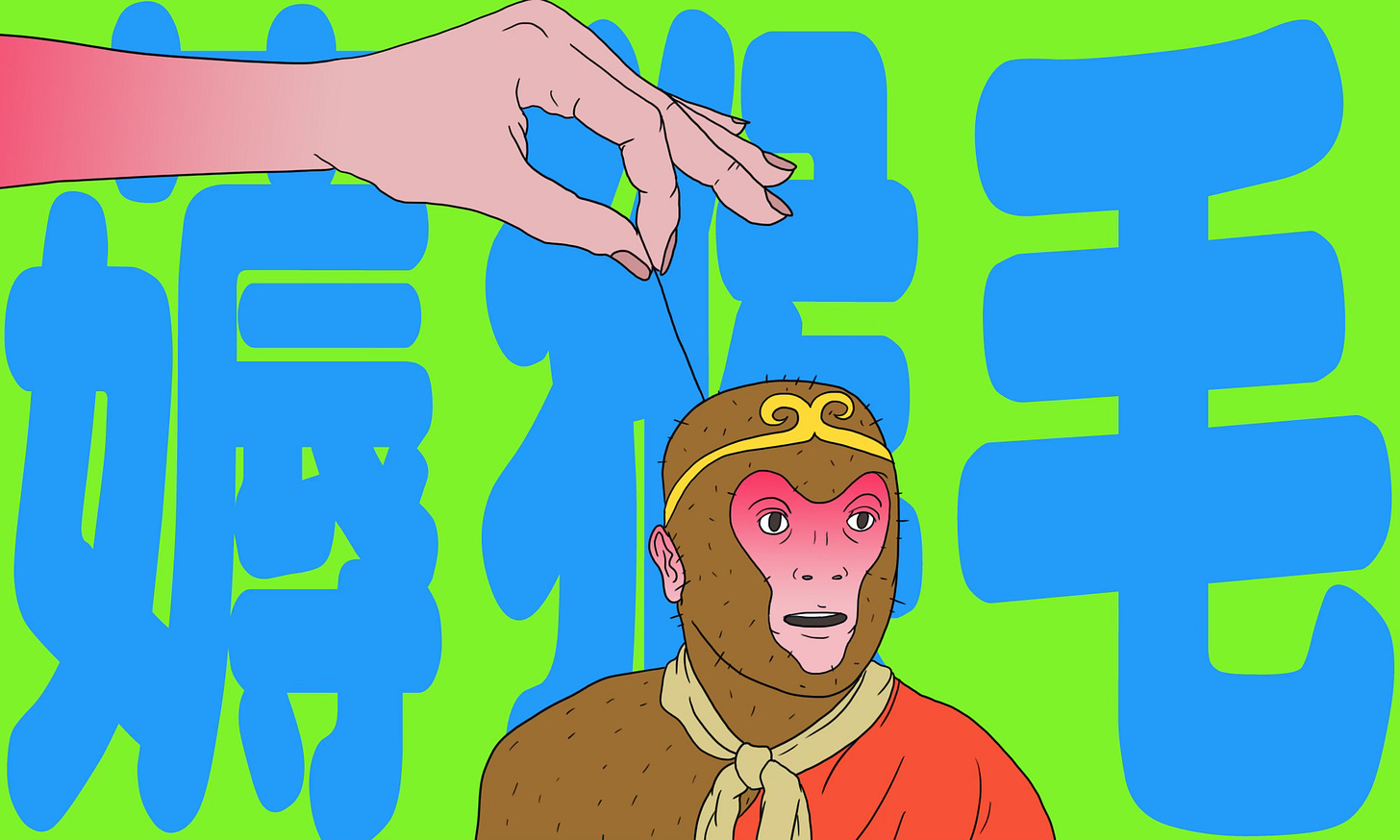"Reaping the benefits" — Phrase of the Week
Shanxi gains from partnering in the launch of China's most successful video game
Our phrase of the week is: "reaping the benefits" (薅猴毛 hāo hóu máo)
Context
Video game, Black Myth: Wukong (黑神话:悟空 hēi shénhuà: wùkōng), has broken the record to become the most-played title of its kind on its first day of release, with 1.4 million concurrent players in its first three hours online.
Released on August 20, the action role-playing game was developed by the Tencent Holdings-backed studio Game Science (游戏科学). The game is inspired by the classic Chinese novel, Journey to the West (西游记), and is named and based on a character of the story, Sūn Wùkōng 孙悟空, a monkey-like mystical being known as the “Monkey King”.
At least 11 brands have partnered with Black Myth to launch co-branded products, from coffee, to clothing, to computers. Even an entire province managed to rebrand itself as the Wukong travel destination.
Shanxi is home to many of the scenes in the game, and from the original story. The province has jumped on the opportunity to market itself to China's huge gaming audience, working with the game developers over four years to recreate the details of Shanxi's ancient architecture in the game, and launching the "Visiting Shanxi with Wukong" (跟着悟空游山西) campaign to coincide with the launch.
So far it’s been a big success for Shanxi:
"As Black Myth contains extensive reference to traditional Chinese architecture, Game Science has even built the first virtual asset library for China’s traditional architecture.
Shanxi's cultural and tourism department was the first to “reap the benefits”.
According to media statistics, the leaked list of locations used in the game shows that Shanxi alone accounts for 27 out of the 36 sites."
由于《悟空》内考据了大量中国传统古建筑,游戏科学还为此搭建了中国首个古建筑虚拟资产库。山西文旅是第一个薅到“猴毛”的,据媒体统计,目前游戏流出的不完整取景地目录显示,36处取景地里山西独占27处。[1]
Yóuyú Wùkōng nèi kǎojù le dàliàng zhōngguó chuántǒng gǔ jiànzhù, yóuxì kēxué hái wèicǐ dājiàn le zhōngguó shǒu gè gǔ jiànzhù xūnǐ zīchǎn kù. Shānxī wénlǚ shì dìyīgè hāo dào “hóu máo” de, jù méitǐ tǒngjì, mùqián yóuxì liúchū de bù wánzhěng qǔjǐng dì mùlù xiǎnshì, 36 chù qǔjǐng dì lǐ Shānxī dú zhàn 27 chù.
And with that we have our Sinica Phrase of the Week!
What it means
"Reap the benefits" is a phrase which needs some unpacking.
The direct translation of the Chinese is: “pluck out” (薅到 hāo dào) "monkey hair" (猴毛 hóu máo).
This is a play on the words of a well-known slang phrase, "plucking wool" (薅羊毛 hāo yángmáo), which has a number of meanings.
"Plucking wool" originated from the sketch, Yesterday, Today and Tomorrow (昨天 今天 明天) performed by comedian Zhào Běnshān 赵本山 and Sòng Dāndān 宋丹丹 during the 1999 Spring Festival Gala.
The sketch is a conversation between an elderly couple, Aunt Baiyun (played by Song) and Uncle Heitu (played by Zhao), looking back on their years of working on a commune in the 1950's.
Aunt Baiyun recalled the time when she wanted to give Heitu a sweater to show her affection towards him.
There was nowhere to buy one at that time so she borrowed a sheep from their commune, and plucked enough wool to knit a sweater.
When the commune discovered this, the sheep was confiscated, the sweater was taken, and Aunt Baiyun was criticized for her poor socialist values, saying she was:
"Digging at the foundations and plucking the wool of socialism."
挖社会主义墙角,薅社会主义羊毛
wā shèhuì zhǔyì qiángjiǎo, hāo shèhuì zhǔyì yángmáo.
In other words, "undermining socialism by exploiting socialist resources".
The gag was a hit with the audience, and the phrase "plucking the wool of socialism" quickly became a popular meme and an early example of an internet slang phrase in China, shared widely online and in the media at that time.
Since then, the meaning of "plucking wool" has evolved.
Nowadays it can refer to "grabbing discounts on online shopping platforms". People who do this are professional discount hunters and members of the "wool party" (羊毛党 yángmáo dǎng).
The passive form of "pluck" (薅) has also come to mean to be "ripped off" (被薅). And to have one's "wool plucked" means to be ripped off when buying a product or service which is overpriced and of poor quality.
"Plucking wool" can also mean to "leverage a situation for one's own commercial benefit". It can have negative, neutral, or positive connotations depending on the context.
This is what "plucking wool" means in the context of brands, and even a province, Shanxi, using the launch of the Black Myth: Wukong to drive sales.
It’s a humorous take on the original phrase, and the "monkey hair" pun is a nod to the main character in the story and game, Sun Wukong, who is the Monkey King and can turn his hair into whatever tool he wants as he plucks it.
That's why we translate "plucking monkey hair" as "reaping the benefits" of co-branding with China's most successful video game ever.
Andrew Methven is the author of RealTime Mandarin, a resource to help you learn contemporary Chinese in context, and stay on top of the latest language trends in China.
Read more about how this story is being discussed in the Chinese media in this week’s RealTime Mandarin.
Bonus: See the original Spring Festival Gala Sketch, with the gag coming in at around 9'30". Also worth noting the differences in audiences back then compared to now!




Wow that's really cool! I should read the column more often